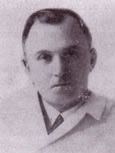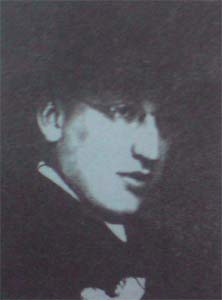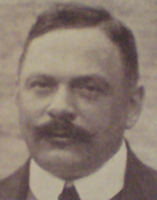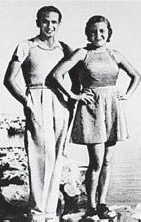 W
WRajka Baković was a Croatian student and a member of the anti-fascist resistance movement in the Nazi-puppet state of the Independent State of Croatia (NDH). She and her sister, Zdenka, used their family newsstand at Nikolićeva Street No. 7 in Zagreb as a central hub for the connection of members of the resistance at the beginning of World War II.
 W
WIrma Benčić was a Croat partisan and anti-fascist. She was active in the Istrian resistance movement against an occupying German army during World War II. Benčić was killed in March 1945 by the Germans; her efforts to liberate Istra are commemorated by a memorial park in her name.
 W
WIvo Brnčić or Brnčič was a Yugoslav author, essayist and literary critic of Croat origin, particularly notable for his assessment of interwar Slovene literature. Most of his works were published posthumously.
 W
WAugust Cesarec was a Croatian writer and communist activist.
 W
WLea Deutsch was a Yugoslavian Jewish child actress who died during the Holocaust.
 W
WMavro "Moše" Frankfurter (1875–1942) was a Croatian rabbi from Vinkovci who was killed during the Holocaust at the Jasenovac concentration camp.
 W
WMiroslav Šalom Freiberger was a Croatian chief rabbi, catechist, translator, writer and spiritual leader. He was educated as a lawyer and doctor of theology.
 W
WFranjo Giler, sometimes spelled Giller, was a Yugoslav footballer.
 W
WIzidor Gross was a Croatian chess master and hazzan.
 W
WDr. Slavko Hirsch was a Croatian physician, founder and director of the Epidemiological Institute in Osijek.
 W
WŽiga Hirschler was a Croatian Jewish composer, music critic and publicist who was killed during the Holocaust.
 W
WIvana Hirschmann was a Croatian gymnastics professor and the first female physical education teacher in Croatia.
 W
WIng. Mihajlo Klajn was a Yugoslav agronomist and communist who was killed during the Holocaust.
 W
WIvan Goran Kovačić was a Croatian poet and writer.
 W
WTina Morpurgo was a notable Croatian painter from Split.
 W
WEdmund Moster was a Croatian Jewish entrepreneur, industrialist, inventor and co-founder of the "Penkala-Moster Company" in Zagreb.
Leo Müller was Croatian industrialist, entrepreneur, philanthropist and second son of well known Croatian industrialist Adolf Müller.
 W
WIzidor Perera-Matić was Yugoslav physician and member of the Partisan resistance movement.
Zvonimir Richtmann was a Croatian Jewish physicist, philosopher, politician and publicist who was killed during World War II by Ustaše.
 W
WRod Riffler was a Croatian modern dance teacher, choreographer and owner of a dance school in Zagreb, who was killed during the Holocaust.
Viktor Rosenzweig (1914–1941) was a Croatian Jewish communist, poet and writer.
 W
WAleksandar Savić was a Croatian communist activist and member of the partisan resistance movement in Croatia, murdered during the Holocaust in the Independent State of Croatia.
Armin Mordekhai Schreiner was influential Croatian industrialist, banker, Jewish activist and member of the first Freemasonry Jewish Lodge Zagreb No. 1090 independent order of B'nai B'rith.
 W
WLavoslav Singer (1866–1942) was Croatian industrialist notable for his role in the development of Bjelovar.
 W
WVlado Singer was a Kingdom of Yugoslavia politician and a prominent member of the Croatian Ustaše movement.
 W
WŠime Spitzer was a Croatian Zionist, notable member of the Jewish community Zagreb and general secretary of the "Federation of Jewish confessional communities of Yugoslavia".
 W
WOton Vinski was an influential Croatian banker who was killed during the Holocaust.